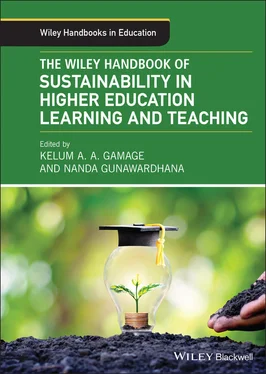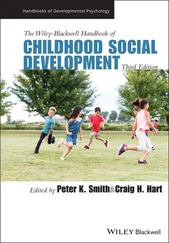Working toward a more sustainable future needs action, and a holistic approach, engaging head, heart, and hands. It needs action which is underpinned by understanding, critical thinking, reflection, and inclusion, and allows students to drive change in their own areas of interest. A traditional knowledge‐based education does not give students the experience of taking action and applying their knowledge and thinking skills to driving change in the real world. Therefore, it is imperative that our universities provide spaces for students to take action and to become activist learners and provide the motivation and skills to both drive change, but to also reflect and learn. This requires the development of “activist learning for sustainability” opportunities within the formal, non‐formal/informal, and hidden curricula, that can provide an exciting and innovative approach to meeting the aspirations of a range of agendas within higher education and empower our learners to drive the change they want to see in the world.
We would like to acknowledge the support and discussions around the project with Dr. Sophie Bessant and Dr. Sherilyn MacGregor, the student interviewees, and all the students involved in the project through the years, and to thank the Higher Education for funding to support the project.
1 Ackoff, R.L. (1974). Redesigning the Future: A Systems Approach to Societal Problems. New York: Wiley.
2 Adelman, S. (2018). The sustainable development goals, anthropocentrism and neoliberalism. In: Sustainable Development Goals (ed. D. French and L.J. Kotzé), 15–40. Edward Elgar Publishing.
3 Barlett, P.F. and Chase, G.W. (2004). Introduction. In: Sustainability on Campus: Stories and Strategies for Change (ed. P.F. Barlett and G.W. Chase). Cambridge, Massachusetts: The MIT Press.
4 Belbin, R.M. (2004). Management Teams: Why they Succeed or Fail, 2e. Oxford: Butterworth Heinemann.
5 Bilon, A.D. (2021). Toward an agentic approach to activist learning: the interplay between agency and learning in the narrative of polish activist. Adult Education Quarterly 71 (2): 166–183.
6 BIS (Business, Innovation and Skills) (2010). Skills for sustainable growth: strategy document. Executive summary. https://www.gov.uk/government/publications/skills‐for‐sustainable‐growth‐strategy‐document (accessed 26 August 2021).
7 BITC (Business in the Community) (2010). Leadership skills for sustainable economy. https://sustainability.glos.ac.uk/wp‐content/uploads/2017/07/BITC_Leadership_Skills‐Report_July10.pdf(accessed 26 August 2021).
8 Blewitt, J. (2006). The Ecology of Learning.: Sustainability, Lifelong Learning and Everyday Life. Earthscan.
9 Bone E. and Agombar J. (2011) First‐year attitudes towards and skills in sustainable development. Higher Education Academy. https://www.advance‐he.ac.uk/knowledge‐hub/2011‐first‐year‐student‐attitudes‐towards‐and‐skills‐sustainable‐development(accessed 29 August 2021).
10 Botsaris, P.N., Giourka, P., Papatsounis, A. et al. (2021). Developing a business case for a renewable energy community in a public housing settlement in Greece—the case of a student housing and its challenges, prospects and barriers. Sustainability 13 (7): 3792.
11 Briggs, S.J., Robinson, Z.P., Hadley, R.L., and Laycock Pedersen, R. (2019). The importance of university, students and students’ union partnerships in student‐led projects: a case study. International Journal of Sustainability in Higher Education 20 (8): 1409–1427. https://doi.org/10.1108/IJSHE‐01‐2019‐0050.
12 Bringle, R.G. and Hatcher, J.A. (1999). Reflection in service learning: making meaning of experience. Educational Horizons 77 (4): 179–185.
13 Brinkman, B.G. and Hirsch, K. (2019). From proposal to action: supporting student advocacy during graduate counseling training. Journal for Social Action in Counseling & Psychology 11 (1): 51–66.
14 Brundiers, K., Barth, M., Cebrián, G. et al. (2021). Key competencies in sustainability in higher education—toward an agreed‐upon reference framework. Sustainability Science 17: 1–17.
15 Bubriski, A. and Semaan, I. (2009). Activist learning vs. service learning in a Women's studies classroom. Human Architecture: Journal of the Sociology of Self‐Knowledge 7: 91–98.
16 Buchanan, J. and Griffin, J. (2010). Finding a place for environmental studies: tertiary institutions as a locus of practice for education for sustainability. Journal of Teacher Sustainability 12 (2): 5–16.
17 Carter, R. (1985). A taxonomy of objectives for professional education. Studies in Higher Education 10 (2): 135–149.
18 Chaplin, G. and Wyton, P. (2014). Student engagement with sustainability: understanding the value‐action gap. International Journal of Sustainability in Higher Education 15 (4): 404–417.
19 Chase, S. (2000). The education and training needs of environmental activists and organizers. Unpublished PhD thesis. University of New England.
20 Cortese, A.D. (2003). The critical role of higher education in creating a sustainable future. Planning for Higher Education 31 (3): 15–22.
21 Costa, A.L., Vaz, H., and Menezes, I. (2021a). The activist craft: learning processes and outcomes of professional activism. Adult Education Quarterly 71 (3): 211–231.
22 Costa, A.L., Vaz, H., and Menezes, I. (2021b). Exploring the meanings of professional activism. Community Development 52 (2): 244–261.
23 Cotton, D., Winter, J., and Bailey, I. (2013). Researching the hidden curriculum: intentional and unintended messages. Journal of Geography in Higher Education 37 (2): 192–203.
24 Cotton, D., Shiel, C., and Paço, A. (2016). Energy saving on campus: a comparison of students’ attitudes and reported behaviours in the UK and Portugal. Journal of Cleaner Production 129: 586–595.
25 Cotton, D., Bailey, J., and Tosdevin, M. (2020). Higher education and the climate emergency: exploring the hidden curriculum of the campus. In: The Hidden Curriculum of Higher Education (ed. T. Hinchcliffe), 29–40. AdvanceHE.
26 Covitt, B. (2002). Motivating environmentally responsible behavior through service‐learning. In: Advances in Service‐Learning Research, vol. 2 (ed. S.H. Billig and A. Furco), 177–197. Age Publishing.
27 Crump, J.R. (2002). Learning by doing: implementing community service‐based learning. Journal of Geography 101 (4): 144–152.
28 Dagiliūtė, R., Liobikienė, G., and Minelgaitė, A. (2018). Sustainability at universities: Students' perceptions from Green and Non‐Green universities. Journal of Cleaner Production 181: 473–482.
29 Drayson, R., Bone, E., Agombar, J., and Kemp, S. (2014). Student attitudes towards and skills for sustainable development. www.heacademy.ac.uk/sites/default/files/resources/student_attitudes_towards_and_skills_for_sustainable_development.pdf(accessed 27 August 2021).
30 Eagan, K., Stolzenberg, E.B., Bates, A.K. et al. (2015). The American Freshman: National Norms Fall 2015. Los Angeles: Higher Education Research Institute, UCLA.
31 England, Y.A. and Marcinkowski, T. (2007). Environmental service‐learning programs in Florida high schools and colleges: nature, status and effects as determined by a statewide program census. The Journal of Environmental Education 38 (4): 51–60.
32 Frisk, E. and Larsen, K. (2011). Educating for sustainability: competencies & practices for transformative action. Journal of Sustainability Education 2: http://www.jsedimensions.org/wordpress/wp‐content/uploads/2011/03/FriskLarson2011.pdf.
33 Gagnon, J. (2020). Campus activism: understanding engagement, inspiration, and burnout in student experiences. Honors Scholar Theses. 665. https://opencommons.uconn.edu/srhonors_theses/665(accessed 24 November 2021)
Читать дальше












